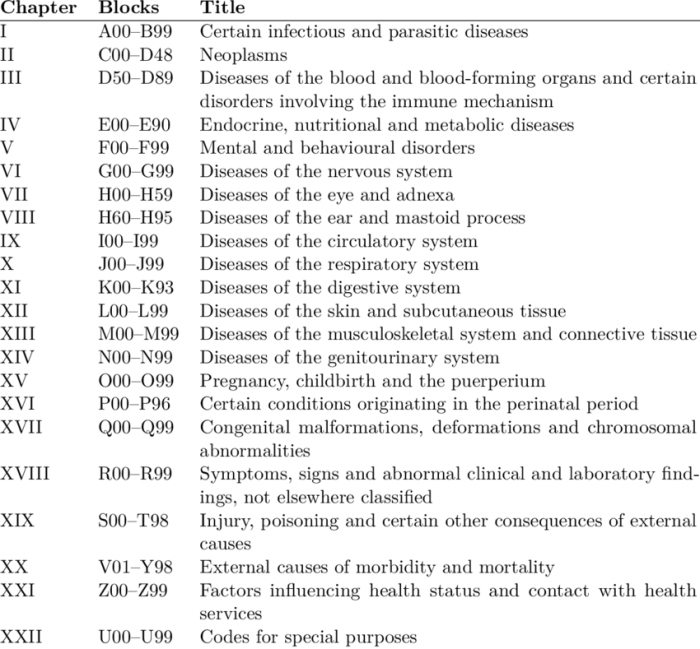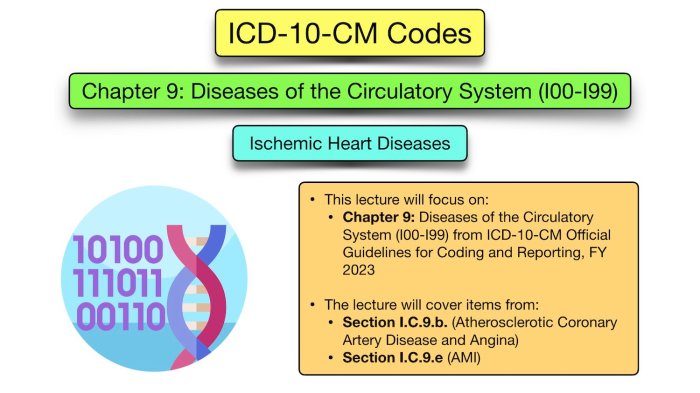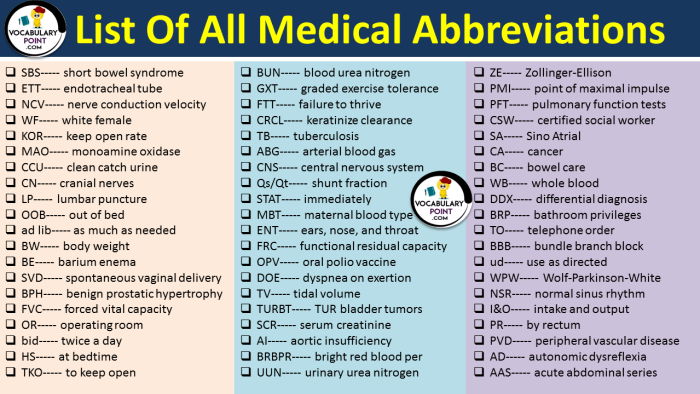Sud medical abbreviation icd 10 – SUD medical abbreviation ICD-10, a crucial component in the healthcare industry, provides a standardized system for classifying Substance Use Disorders. This comprehensive guide delves into the purpose, causes, symptoms, treatment, complications, and prevention strategies associated with SUD, offering valuable insights for healthcare professionals and individuals seeking to understand this prevalent condition.
ICD-10 codes play a vital role in the accurate diagnosis and effective management of SUD, ensuring consistent communication and documentation among healthcare providers.
Introduction to SUD Medical Abbreviation ICD-10
ICD-10 codes are standardized medical abbreviations used to classify diseases and conditions in the healthcare field. The Substance Use Disorder (SUD) medical abbreviation falls within this classification system, providing a specific code to identify and track individuals with SUD.
SUD is a complex condition characterized by compulsive substance use despite negative consequences. ICD-10 codes for SUD help healthcare professionals accurately diagnose and manage this disorder.
Causes and Risk Factors of SUD
SUD can result from a combination of genetic, environmental, and social factors. Genetic predisposition can increase the risk of developing SUD, while environmental influences such as exposure to substance abuse and trauma can contribute to its onset.
Mental health disorders, particularly anxiety and depression, are often associated with SUD. Substance abuse can be a coping mechanism for individuals with mental health issues.
Symptoms and Diagnosis of SUD
Common symptoms of SUD include impaired control over substance use, cravings, and withdrawal symptoms. Individuals may experience difficulty reducing or stopping substance use despite negative consequences in their personal, social, or occupational life.
Diagnosis of SUD according to ICD-10 guidelines involves a clinical assessment by a healthcare professional. They evaluate the individual’s substance use history, patterns, and the presence of specific symptoms.
Treatment and Management of SUD

Treatment for SUD typically involves a combination of pharmacological interventions, behavioral therapies, and support groups. Pharmacological treatments may include medications to reduce cravings and withdrawal symptoms.
Behavioral therapies focus on changing unhealthy thoughts and behaviors associated with substance use. Support groups provide a safe and supportive environment for individuals to share their experiences and receive encouragement from peers.
Complications and Prognosis of SUD: Sud Medical Abbreviation Icd 10

SUD can lead to various medical, psychological, and social complications. Medical complications may include liver damage, heart disease, and respiratory problems. Psychological complications can include anxiety, depression, and psychosis.
The prognosis of SUD depends on several factors, including the severity of the disorder, the individual’s motivation for recovery, and the availability of support services. Early intervention and ongoing support are crucial for improving outcomes.
Related Medical Conditions and ICD-10 Codes
SUD is often associated with other medical conditions, including:
- Mental health disorders (F00-F99)
- Alcohol-related disorders (F10)
- Opioid use disorders (F11)
- Cannabis use disorders (F12)
- Sedative, hypnotic, or anxiolytic use disorders (F13)
Prevention and Public Health Measures

Preventing SUD involves a multi-faceted approach, including education, community outreach, and policy changes. Education programs aim to raise awareness about the risks of substance abuse and promote healthy coping mechanisms.
Community outreach programs provide support and resources to individuals at risk of SUD. Policy changes, such as regulating substance availability and increasing access to treatment, can also contribute to prevention efforts.
Final Wrap-Up
Understanding SUD medical abbreviation ICD-10 empowers healthcare professionals with the knowledge and tools necessary to provide appropriate care and support for individuals struggling with Substance Use Disorders. By recognizing the underlying causes, symptoms, and potential complications, we can work towards early intervention, effective treatment, and improved outcomes for those affected by SUD.
Expert Answers
What is the purpose of ICD-10 codes for SUD?
ICD-10 codes provide a standardized system for classifying and documenting Substance Use Disorders, ensuring accurate diagnosis, effective treatment, and consistent communication among healthcare providers.
What are the common symptoms of SUD?
Common symptoms of SUD include impaired control over substance use, cravings, withdrawal symptoms, and negative consequences in various aspects of life.
What are the different treatment approaches for SUD?
Treatment approaches for SUD may include pharmacological interventions, behavioral therapies, support groups, detoxification, rehabilitation, and relapse prevention strategies.